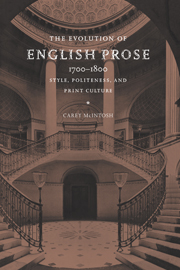Book contents
- Frontmatter
- Contents
- Preface
- 1 The ordering of English
- 2 Literacy and politeness: the gentrification of English prose
- 3 Testing the model
- 4 Loose and periodic sentences
- 5 Lofty language and low
- 6 Nominal and oral styles: Johnson and Richardson
- 7 The New Rhetoric of 1748 to 1793
- 8 The instruments of literacy
- 9 Politeness; feminization
- 10 Style and rhetoric
- Epilogue: language change
- References
- Index
2 - Literacy and politeness: the gentrification of English prose
Published online by Cambridge University Press: 18 December 2009
- Frontmatter
- Contents
- Preface
- 1 The ordering of English
- 2 Literacy and politeness: the gentrification of English prose
- 3 Testing the model
- 4 Loose and periodic sentences
- 5 Lofty language and low
- 6 Nominal and oral styles: Johnson and Richardson
- 7 The New Rhetoric of 1748 to 1793
- 8 The instruments of literacy
- 9 Politeness; feminization
- 10 Style and rhetoric
- Epilogue: language change
- References
- Index
Summary
Even if there is such a thing as meaning (whatever ‘thing’ means in this context), its ontological and psychological status is surely more questionable than that of form.
(John Lyons, Linguistic Semantics: 1995)What does “the evolution of prose during the eighteenth century” consist of? Can minor alterations in syntax, or in characteristic ways of ending sentences, or in preferred vocabulary, add up to a substantial change in habitual modes of discourse? In the language itself? The changes I shall be describing belong both to historical linguistics and to the history of English prose: some are grammatical, some semantic, some a matter of style.
Having described these changes, how can I convince the reader that they were “habitual”? Which modes of discourse were central or typical at which times? In any single decade of the eighteenth century, a great many different varieties of texts were published; and it is sometimes difficult to decide that a given kind is really and truly characteristic or uncharacteristic. In 1710 appeared an essay of which “the language differ[s] only slightly from present-day English,” according to Charles Barber, but one can also find texts from the 1770s which sound to other judges positively Elizabethan: “That of ch, as in such; and its like, but stronger expressed by g before e or i generally, and by j before any vowel always”; “A redundant after e, when it serveth not to make e long”; “This is the next open sound; which as it is narrower, so is it shorter.”
Most histories of English do not see the language as changing much between 1700 and 1800.
- Type
- Chapter
- Information
- The Evolution of English Prose, 1700–1800Style, Politeness, and Print Culture, pp. 22 - 41Publisher: Cambridge University PressPrint publication year: 1998



